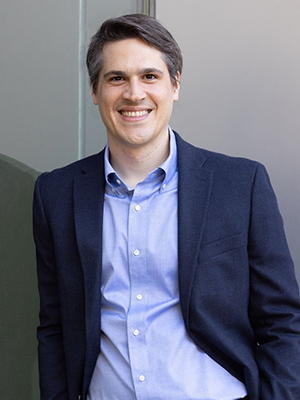
Sep 11, 2025 Faculty Finance Research in Education
Gies Business adds growing influencer in macrofinance

Shadow banks have increased their market share from 35 percent to more than 60 percent in the last quarter-century, notes newly minted assistant professor of finance Andres Sarto. Sarto has become an authority in macrofinance, banking, and empirical methods and has taken a significant interest in the impact of shadow banks on the mortgage market.
He says higher interest rates and government regulations are perhaps just two of the factors that hurt traditional banks since the turn of the century. He is looking forward to collaborating with colleagues at Gies Business in the coming years to investigate further how these factors are impacting banking.
Sarto earned a bachelor’s and postgraduate degree from the Universidad Torcuato Di Tella in Buenos Aires, Argentina, and a PhD from MIT. After a year as a postdoctoral researcher at Princeton, he has made academic stops at both New York University’s Stern School of Business and the University of Chicago’s Booth School of Business.
His study, “The Secular Decline in Interest Rates and the Rise of Shadow Banks,” which he co-authored with Olivier Wang, was accepted by the Journal of Financial Economics. The paper notes that while shadow banks compete in the same markets, the low-rate environment prevalent since the early 2000s has been particularly harmful for traditional banks. He is curious whether the recent rise in interest rates will persist for a significant period and, if so, how it will affect financial markets.
“If you look at the last 25 years, we are coming off a prolonged period of low rates,” he said. “It is an important force. The reason for that is that traditional banks rely on deposits to fund their operations, and shadow banks don’t. Basically, when rates go down in the manner that they did, traditional banks get hit on that side of their business, hurting their profits. If that persists for a long period of time, it finds a way to also affect lending. We are not saying that technology and regulation are not important. The three forces created space for shadow banks to step up and grow. We say that this third force was in play because traditional banks have a different business model.”
Sarto’s research expands into local labor markets. He is a co-author on a study, “Local Shocks and Internal Migration: The Disparate Effects of Robots and Chinese Imports in the U.S.”
“I think we are entering a phase where the Fed will most likely be battling inflation from the tariffs and a deterioration of the labor market,” Sarto said. “It will be interesting to see how that plays out against the financial sector. It is generating a lot of interesting topics for research.”
Sarto says he is excited to join Gies Business because “it has great energy, the research is cutting-edge, and it has a stimulative environment.”
In addition to the faculty, Sarto is excited about the potential for Gies students to succeed in the classroom and in their careers. “I am looking for students with a passion for the subject. The more passion they have, the more prosperous they are going to be”, Sarto said.
Outside of his profession, Sarto enjoys tennis, soccer, running, and spending time with his wife and two-year-old daughter.
“Champaign-Urbana has all the features that I think you would want for younger kids,” Sarto said. “Coming from New York City, where space was tough to get, I’m looking forward to having more space and a yard here.”
